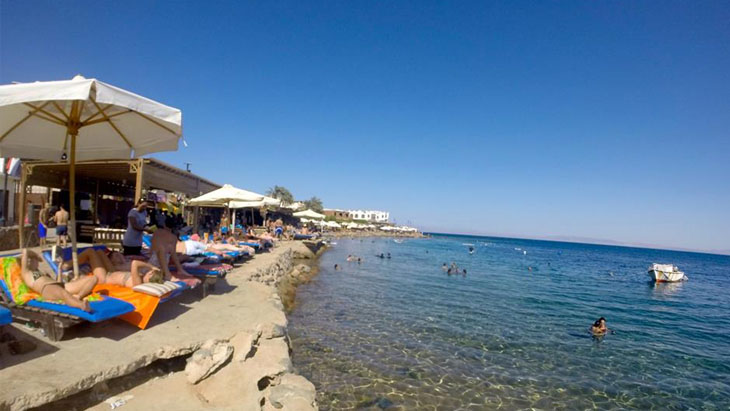Twenty-five years ago, Mohammed A. moved to the beach resort town of Hurghada after earning a diploma in commerce in Luxor City, to work in the tourism business. Now over 40 years old, Mohammed works as a marketing manager in a major tourist company. He is married to an Egyptian woman, but has been married to four foreigners since arriving as a young man.
“At that time, I was a young, middle-class man who wanted to marry, and I did not want to engage in an ‘illicit relationship’ with foreign tourists,” Mohammed recalls. “My first marriage to a German tourist lasted five years and was legally consummated, during which time I travelled to Germany where I stayed for one year and returned to Hurghada again.”
Fehmy Higab, who lives in Hurghada, specializes in tailoring marriage contracts between Egyptians and foreign women. He believes that common law or customary marriage has been a solution for young Egyptian men, who do not want to violate religious teachings and social traditions by entering into illicit relationships with foreign women, especially in tourist resorts with many foreigners.
Another reason for choosing this type of marriage is the low cost of the contractual arrangements. Customary contracts allow the married couple to stay in hotels, although some hoteliers do not recognize their legality. They may also rent a house as husband and wife.
A lawyer, who has become known as ‘Lawyer of the Shore’ due to his continuous availability there, processes these contracts to arrange marriages between Egyptians and foreign women.
If at first you don’t succeed . . .
After separating from his German wife, Mohammed married an English woman. That marriage was official and lasted two years. He later married a Polish woman, followed by a Dutch woman – both marriages were arranged outside Sharia courts. The longest of them lasted six months.
“In all those marriages there was mutual admiration, although I knew that such relationships would not last long,” Says Mohammed. “For that reason we mutually agreed not to have children. On the other hand, I did not want to act against my religious beliefs and customary marriage had been the appropriate solution.”
According to Higab, few people convert customary contracts to ‘official’ contracts, because this procedure is relatively complicated. To do so, one of the two parties (in most case the wife) has to start a legal process to confirm the relationship, and the husband must attest to its validity. Only then will the customary contract become official.
The process of getting an official contract, according to Higab, costs about E£ 5,000 (USD 280), while a customary marriage contract does not cost more than E£ 600 (USD 33.50). Therefore, the couple does not usually certify their marriage unless they wish to establish a long-lasting relationship, and this requires some papers, duly filled by both the Egyptian and foreign spouses. Marriage in such cases takes place at the foreigners’ marriage department in the justice ministry. The certified documents will have to be further attested by the foreign ministry and registered with the relevant foreign embassy. Then, the contract will become valid in both countries.
Fehmy Higab has said that the number of Egyptians officially married to foreign women has risen during the past year, according to the figures released by the foreigners’ marriage section at the finance ministry. In 2016, there were 6,500 registered marriages, up from 4,500 in 2015. Customary marriages, on the other hand, outnumber consummated marriages, but it is difficult to give price figures.
According to Higab, the number of Egyptians marrying Arab women, particularly Syrians, has strikingly increased in recent years, compared with marriage to European women. Statistics have revealed that Palestine and Morocco rank second after Syria with respect to marriages to non-Egyptian men. With regard to marriage to Western women, most of these marriages belong to Russia, UK, Canada, Germany, Italy, USA, Ecuador and Colombia.
Most of the Egyptians married to foreigners live in the tourist resort cities like Sharqia, Arish, Monufia, Qalyubia, Cairo, and Aswan.

